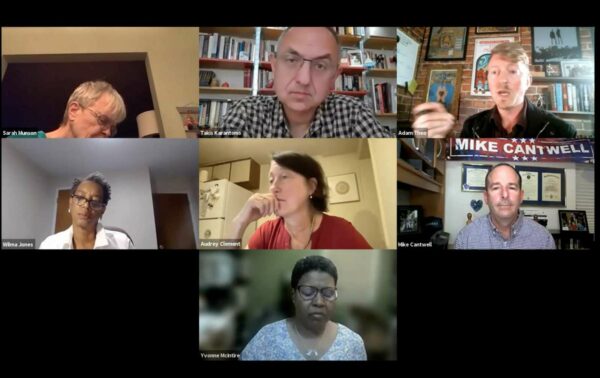
Local candidates offered differing takes on police oversight and demographic disparities in public schools during a candidate forum last night.
The Arlington branch of the NAACP hosted Monday’s forum, featuring the four Arlington County Board candidates — incumbent and Democrat Takis Karantonis and independents Mike Cantwell, Audrey Clement and Adam Theo — as well as School Board candidates Mary Kadera and former Congressional candidate Major Mike Webb.
More than 100 people were in virtual attendance.
The forum addressed two dozen issues facing the county and its communities of color. County Board topics ranged from support for minority-owned businesses to accountability for developers that neighbors say violate construction terms. Schools topics spanned the unequal distribution of Parent-Teacher Association resources to improving outcomes for students of color.
But the sharpest distinctions among County Board candidates came out during a discussion of the powers endowed to the new police oversight board.
This summer, the Arlington County Board established a Community Oversight Board (COB) with subpoena power and authorized the hiring of an Independent Policing Auditor able to investigate community complaints about police officers. The decision, came amid sharp disagreements over whether board had too much, or too little, authority.
“The overall perception from many of the members, [and] people I know who are not NAACP members… is that the board is aligned with interests that are not the ones that the community is telling you we want,” said moderator Wilma Jones Kilgo.
When asked if the COB aligns with their visions, only Karantonis said it did.
“It aligned mostly with [my] vision,” Karantonis said. “We now have to nominate the board, make it work, fund it and staff it.”
Cantwell said the board shouldn’t have subpoena power or investigatory power.
“Elections are where you should hold people accountable,” he said. “You should hold the current County Board, who appoints the County Manager and the police chief, accountable, and vote them out.”
But Theo and Clement said the Community Oversight Board isn’t independent enough.
“I’m glad we got the subpoena power, but it fails utterly with not being able to properly investigate and not being able to follow through with discipline,” Theo said. “It needs to be independent. Right now, it’s still under the County Manager, that isn’t enough.”
Clement, who supports giving the board subpoena power, nonetheless called it “a toothless tiger.”
“In situations where the oversight board exercises concurrent jurisdiction with the police department in a personnel matter, I believe COB should have binding authority, as the likelihood of the police chief honoring a recommendation of the COB that goes against his own decision is nil,” she said.
She also expressed concern that the County Manager, who hires the police chief, also hires the independent auditor.
Later, Karantonis said the County Board has put some pressure on the state to change the law that gives Arlington the power to hire a police auditor.
“It is a flaw that the County Manager formally chooses this person,” he said. “We have asked the General Assembly to change that and fix other flaws in this [provision].”
Meanwhile, Jones pressed Clement and Theo on other issues they raised related to policing and the criminal justice system.
Theo, the only candidate to mention qualified immunity — which defends law enforcement officials from lawsuits for alleged civil rights violations — and demilitarizing the police, said both should end.
“I say this as someone who has worked alongside law enforcement… but what’s more, I have been through the criminal justice system,” he said. “I was a troubled teen, and committed crimes — guilty, of course — and spent four months in jail down in Florida. I can undeniably say we need major, serious radical police reform in the country and the county.”
He said ending qualified immunity will involve pressuring the state through elected representatives, while demilitarizing the police simply involves the county refusing military-grade equipment.
That may already be occurring, as last October, Gov. Ralph Northam signed into law a bill that — in most cases — prohibits law-enforcement agencies from acquiring and using military property.
Clement was asked about her stance critical of restorative justice reforms, which Jones said communities of color support.
“I am concerned about its potential for abuse in schools,” Clement said. “I will insist it be used to supplement rather than replace traditional judicial process.”
During the school board discussion, Webb and Kadera came down on different sides of using school boundary processes to integrate schools that draw from demographically homogeneous zones.
“We need to talk about why integration is our goal, and collectively get clear about that, and we need to look at the available options to integrate schools,” such as bussing and magnet schools, or other options, said Kadera, who received the Democratic endorsement.
Webb, who is Black, said he doesn’t believe that “black lines matter.”
“I think what we have to do is make sure every school, no matter where you are or zip code, is performing well,” he said. “You go to Wakefield High School, that is your underperforming high school, it also happens to be most diverse, you go to Yorktown, that is your least diverse, and they’re the best performing. If a kid of color is going to do better there, why can’t they do better at Wakefield High School?”
Some viewers jumped in on the Zoom chat, taking exception to Webb’s “Black Lives Matter” reference. Jones told Webb to check his facts, as some students zoned for Yorktown opt not to attend it, despite the benefits he suggested.
In response, Kadera said the community may decide “to adopt an approach where it is not important to achieve more demographic diversity in our schools and where [the School Board] will instead to look at the resourcing in every school… but we haven’t had that conversation yet.”

